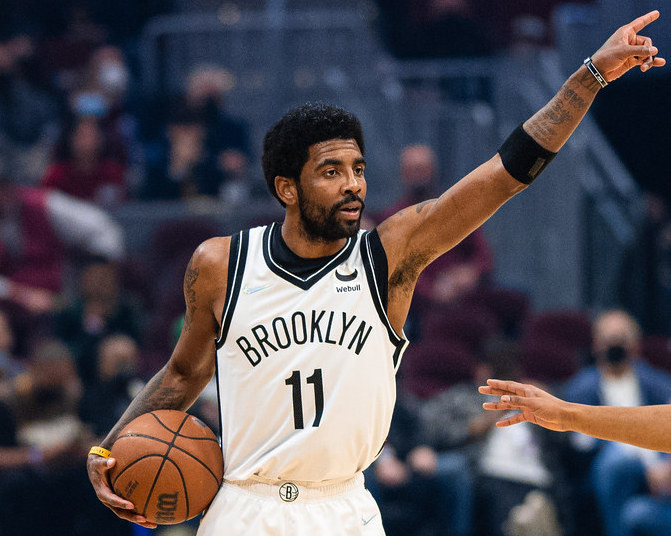Crying Foul
Were Double Standards Applied to Kyrie Irving? Yes, but not in the Way His Fans Think
Carl Yonker

For several weeks, the talk of American sports media has focused on the saga of Kyrie Irving, a seven-time NBA all-star guard who has played for the Brooklyn Nets since 2019.
Irving shared a link to “Hebrews to Negroes: Wake Up Black America,” a three-and-a-half-hour documentary based on a book of the same name by Ronald Dalton.
Dalton promotes a Black Hebrew Israelite (Black Israelism) belief that African-Americans are the true descendants of biblical Israel.
This belief is not inherently antisemitic.
Yet Dalton embraces a more extreme interpretation than do other groups within the Black Hebrew Israelite community. He suggests modern Jews are imposters who have usurped Black people of their religious heritage by promoting the “lies” that Jesus was a Jew and that six million Jews were murdered in the Holocaust. His film includes several antisemitic notions about Jewish power and greed, antisemitic quotes by Henry Ford, and fake quotes by Hitler.
Centered in Israel’s southern town of Dimona, the 5,000-member Black Hebrew community originates in a group that migrated to Israel in the 1960s from Chicago. Dalton is not connected to the Dimona community.
The question remains open whether Irving actually watched Dalton’s film and, if he did, what parts of the film he agrees with and what he does not.
One way or another, a hitherto little-known antisemitic book and film are now bestsellers on Amazon, Apple Books, and Barnes & Noble.
Were it not for Irving, Dalton’s work would have remained in obscurity, his boxes of DVDs and books collecting dust.
That ship has sailed.
We should always keep in mind that managements, sponsors, and fans do not own athletes, who reserve the right to speak up their minds, just like anyone else. Yet, with great fame, and great income, comes great responsibility.
At the very least, Irving neglected his.
He initially refused multiple opportunities to apologize for posting the link and doubled down and defended his conduct.
As a result, the Brooklyn Nets organization suspended him, initially, for no less than five games and demanded he satisfy “a series [of six] remedial measures that address the harmful impact of his conduct” before he is allowed to take the court again.
To date, Irving has missed eight games. Regardless of his decision to ultimately apologize, he already caused damage.
Some former players and commentators criticized Irving. They also criticized the hesitant responses of the NBA and Brooklyn Nets, the overwhelming silence of NBA players, and Amazon and other online retailers for offering the anti-Jewish book and film for sale and rent.
However, after Irving was suspended, a new discourse and narrative emerged that, while not absolving Irving of responsibility for his actions, deemed the punishment he received excessive and connected to the color of his skin.
It is possible and indeed legitimate to condemn actions and, at the same time, criticize the punishment meted out.
Lebron James, the greatest active NBA star, did just that. He criticized his former teammate for “[causing] harm to a lot of people,” yet argued that since Kyrie apologized, he should be able to play and called what Irving was asked to do in order to get back on the floor “excessive.”
James’ comments were echoed by other players throughout the league and the National Basketball Players Association (NBPA).
Respected sports commentators like Stephen A. Smith and Shannon Sharpe argued Irving’s punishment revealed a double standard when it comes to what is required of black men to make amends versus others.
Yet, while the double standard they speak of is real, it is not in play in this case, at least not in the way they think.
If they want an example of double standards, they need not look further than Meyers Leonard.
Leonard was a journeyman center for the Miami Heat who, in the spring of 2021, used an antisemitic slur while playing a video game during a livestream on Twitch. Recordings of the incident were widely shared on social media.
The NBA and Miami Heat responded swiftly and in an uncompromising manner. Leonard was suspended, fined $50,000, and traded from the Heat to the Oklahoma City Thunder, which ultimately severed his contract and released him.
Leonard has been out of the league since.
Not only did the NBA and Heat organization swiftly respond to Leonard’s antisemitic slur, Leonard, too, issued a quick apology that demonstrated contrition, remorse, and sincerity.
He took the initiative in meeting with the ADL and the local Jewish community, held basketball camps for Jewish kids, and spoke at a Chabad gathering at the University of Illinois, his alma mater.
So, on the issue of double standards and using the most salient example for comparison, how does Irving’s treatment compare?
Leonard, whose prominence does not compare to Irving’s, was swiftly punished, and essentially kicked out of the league. Irving, considered one of the best players in league history, would likely have avoided any punishment save for mild rebuke had he not tripled down on defending his tweet.
Irving also maintained his job; the team hasn’t traded him or tried to run him out of the league. He will likely soon return.
So yes, there are different standards, just as there are different standards for different players when it comes to officiating on the court.
In this case, the calls went Irving’s way, not Leonard’s.
Had Irving just apologized, not for his (assumed) embrace of the belief that Black people are the true descendants of Israel, but for promoting views that amount to Holocaust denial, the news cycle would have moved on.
He didn’t. What a shame: his actions, and inactions, made an antisemitic publication a bestseller, undermined American Jews’ sense of security, unjustly stained a small black community in Israel, and, least importantly but still regrettably, got a sports legend benched.
